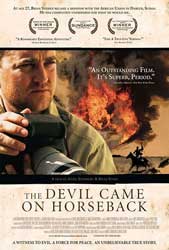 Several documentaries have focused on the plight of the people of Darfur recently (“Darfur Now”) but one that has made the top ten list of several of my favorite film critics is “The Devil Came On Horseback”.
Several documentaries have focused on the plight of the people of Darfur recently (“Darfur Now”) but one that has made the top ten list of several of my favorite film critics is “The Devil Came On Horseback”.
While it is not exactly an uplifting, Friday night, kick back with some popcorn kind of movie, it may be one of the most important films of the past year. But “Devil” proves once again the importance of film as a medium to bear witness to the value of the helpless and disenfranchised. “Devil” is the haunting, unforgettable eyewitness account of Brian Steidle, a former U.S. Marine who naively signs on to become an “official military observer” in Sudan. Unprepared for the atrocities he encounters, Steidle moves from shock to frustration to outrage as he begins to document the devastaton and destruction of the African Sudanese. His story is not only an indictment of the Arab government that is systematically committing genocide, but an indictment of the U.S. government which empowered him to do absolutely nothing, even upon his return from Sudan. Though this movie is not easy to watch, this is an eyeopening story, and I have to recommend it as my DVD pick for this week.
It would be impossible to view this movie if it was only a series of sequences in which we see piles of dead bodies or listen to heartbreaking intervews with those refugees still clinging to life. Yes, there is plenty of all of that in this film, but what anchors this documentary is Steidle’s life-changing journey from solider to crusader. Steidle is allowed into some of the very worst areas of Sudan and he takes pictures of the carnage because there is little else he can do. After six months, he returns to the U.S. to try to bring attention to the genocide, but with little success. Undeterred, Steidle continues his activism, determined to raise awareness to the thousands of lives lost.
In one part of the film, Steidle is on bus passing through a village and weeps as he says, “I stood there for six months and watched people die, and I took pictures of them.” In that moment, I cried with him, because his feelings of guilt and shame transferred to me as I realized even with the awareness I do have of the subject matter. I still am relatively uninformed and inactive in regards to this crisis. But this movie is a wake up call that not one of us is unaccountable at this point in history if we continue to ignore what is happening to innocent people in the Sudan.


